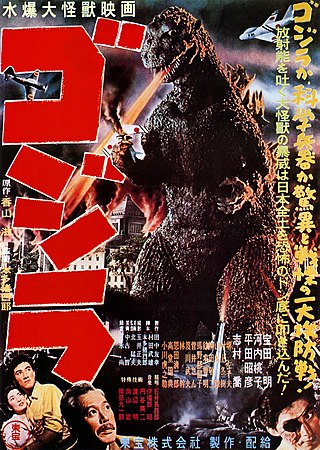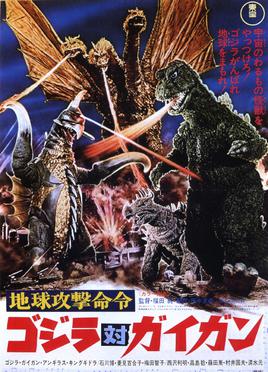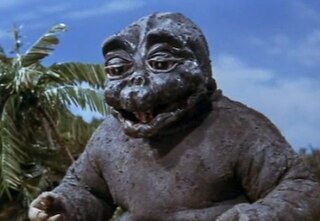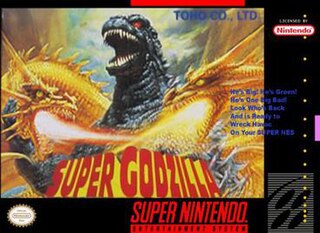Godzilla , also known as Gojira, is a fictional Japanese monster.
Contents
Godzilla may also refer to:
Godzilla , also known as Gojira, is a fictional Japanese monster.
Godzilla may also refer to:

Godzilla is a fictional monster, or kaiju, that debuted in the eponymous 1954 film, directed and co-written by Ishirō Honda. The character has since become an international pop culture icon, appearing in various media: 33 Japanese films produced by Toho Co., Ltd., five American films, and numerous video games, novels, comic books, and television shows. Godzilla has been dubbed the King of the Monsters, an epithet first used in Godzilla, King of the Monsters! (1956), the American localization of the 1954 film.

Godzilla vs. Biollante is a 1989 Japanese kaiju film directed and written by Kazuki Ōmori, with special effects by Kōichi Kawakita. Distributed by Toho and produced under their subsidiary Toho Pictures, it is the 17th film in the Godzilla franchise, the second film in the franchise's Heisei period, and a sequel to 1984's The Return of Godzilla. The film stars Kunihiko Mitamura, Yoshiko Tanaka, Masanobu Takashima, Megumi Odaka, Toru Minegishi, Yasuko Sawaguchi, Toshiyuki Nagashima, Yoshiko Kuga, Ryunosuke Kaneda and Kōji Takahashi. This was Odaka's first appearance in the Godzilla franchise as Miki Saegusa, and would reprise the role in every film for the remainder of the Heisei series.

Godzilla vs. Mothra is a 1992 Japanese kaiju film directed by Takao Okawara, with special effects by Kōichi Kawakita. Distributed by Toho and produced under their subsidiary Toho Pictures, it is the 19th film in the Godzilla franchise, and is the fourth film in the franchise's Heisei era. The film features the fictional monster characters Godzilla, Mothra, and Battra, and stars Tetsuya Bessho, Satomi Kobayashi, Takehiro Murata, Megumi Odaka, Shiori Yonezawa, Makoto Otake, Akiji Kobayashi, Koichi Ueda, Shinya Owada, Keiko Imamura, Sayaka Osawa, Saburo Shinoda and Akira Takarada, with Kenpachiro Satsuma as Godzilla. The plot follows Battra and Mothra's attempts to stop Godzilla from attacking Yokohama.

Godzilla is a 1954 Japanese epic kaiju film directed and co-written by Ishirō Honda, with special effects by Eiji Tsuburaya. Produced and distributed by Toho Co., Ltd., it is the first film in the Godzilla franchise. The film stars Akira Takarada, Momoko Kōchi, Akihiko Hirata, and Takashi Shimura, with Haruo Nakajima and Katsumi Tezuka as Godzilla. In the film, Japan's authorities deal with the sudden appearance of a giant monster, whose attacks trigger fears of nuclear holocaust in post-war Japan.

Gamera is a fictional monster, or kaiju, originating from a series of Japanese films. Debuting in the 1965 film Gamera, the Giant Monster, the character and the first film were intended to compete with the success of Toho's Godzilla film series. Since then, Gamera has become a Japanese icon in his own right, appearing in a total of 12 films produced by Daiei Film and later by Tokuma Shoten and Kadokawa Daiei Studio respectively, and various other media such as novelizations, manga, video games, and so on.

Mothra is a fictional monster, or kaiju, that first appeared in the 1961 film Mothra, produced and distributed by Toho Studios. Mothra has appeared in several Toho tokusatsu films, often as a recurring monster in the Godzilla franchise. She is typically portrayed as a colossal sentient larva (caterpillar) or imago, accompanied by two miniature fairies speaking on her behalf. Unlike several other Toho monsters, Mothra is a largely heroic character, having been variously portrayed as a protector of her own island culture, the Earth and Japan. Mothra's design is influenced by silkworms, their imagos, and those of giant silk moths in the family Saturniidae. The character is often depicted hatching offspring when approaching death, a nod to the Saṃsāra doctrine of numerous Indian religions.

Godzilla vs. Gigan, is a 1972 Japanese kaiju film directed by Jun Fukuda, written by Shinichi Sekizawa, and produced by Tomoyuki Tanaka, with special effects by Teruyoshi Nakano. Distributed by Toho and produced under their effects-based subsidiary Toho-Eizo, it is the 12th film in the Godzilla franchise, and features the fictional monster characters Godzilla, Gigan, Anguirus, and King Ghidorah. The film stars Hiroshi Ishikawa, Yuriko Hishimi, Tomoko Umeda, and Minoru Takashima, alongside Haruo Nakajima as Godzilla, Kenpachiro Satsuma as Gigan, Koetsu Omiya as Anguirus, and Kanta Ina as Ghidorah. It is the last film in which Godzilla was portrayed by Nakajima after playing the character since the original 1954 film; he subsequently retired from suit acting.

Godzilla vs. Destoroyah is a 1995 Japanese kaiju film directed by Takao Okawara, with special effects by Kōichi Kawakita. Distributed by Toho and produced under their subsidiary Toho Pictures, it is the 22nd installment in the Godzilla franchise, and is the seventh and final film in the franchise's Heisei period. The film features the fictional monster characters Godzilla, Godzilla Junior and Destoroyah, and stars Takuro Tatsumi, Yōko Ishino, Yasufumi Hayashi, Sayaka Osawa, Megumi Odaka, Masahiro Takashima, Momoko Kōchi and Akira Nakao, with Kenpachiro Satsuma as Godzilla, Hurricane Ryu as Godzilla Junior, and Ryo Hariya as Destoroyah.

Godzilla vs. Mechagodzilla II, is a 1993 Japanese kaiju film directed by Takao Okawara, with special effects by Kōichi Kawakita. Distributed by Toho and produced under their subsidiary Toho Pictures, it is the 20th film in the Godzilla franchise, as well as the fifth film to be released during the franchise's Heisei era. The film features the fictional monster character Godzilla, along with Baby Godzilla, Rodan and the mecha character Mechagodzilla. Despite its English title, the film is not a sequel to the 1974 film Godzilla vs. Mechagodzilla.

Godzilla vs. SpaceGodzilla is a 1994 Japanese kaiju film directed by Kensho Yamashita, with special effects by Kōichi Kawakita. Distributed by Toho and produced under their subsidiary Toho Pictures, it is the 21st film in the Godzilla franchise, as well as the sixth film in the franchise's Heisei series. The film is notable for the introduction of the monster SpaceGodzilla, as well as the re-introduction of the mecha character M.O.G.U.E.R.A.; its first appearance on-screen since the 1957 film The Mysterians.

Mechagodzilla is a fictional mecha character, or monster, that first appeared in the 1974 film Godzilla vs. Mechagodzilla. In its debut appearance, Mechagodzilla is depicted as an extraterrestrial villain, a robot created by alien invaders to confront and destroy Godzilla. In subsequent iterations, Mechagodzilla is usually depicted as a man-made robotic weapon designed to defend Japan against Godzilla and other kaiju. In all incarnations, the character is portrayed as a robotic doppelgänger of Godzilla with a vast array of high-tech weaponry. Along with King Ghidorah, Mechagodzilla is commonly considered to be an archenemy of Godzilla.

Godzilla Against Mechagodzilla is a 2002 Japanese kaiju film directed by Masaaki Tezuka, with special effects by Yūichi Kikuchi. Distributed by Toho and produced under their subsidiary Toho Pictures, it is the 27th film in the Godzilla franchise and the fourth film in the franchise's Millennium period, and is also the 26th Godzilla film produced by Toho. The film features the fictional giant monster character Godzilla, along with an updated version of the mecha character Mechagodzilla, who is referred to in the film as Kiryu. The film stars Yumiko Shaku, Shin Takuma, Kou Takasugi, Yuusuke Tomoi, Kumi Mizuno, and Akira Nakao, with Tsutomu Kitagawa as Godzilla and Hirofumi Ishigaki as Kiryu.

Minilla is a fictional monster, or kaiju who first appeared in Toho's 1967 film Son of Godzilla. He is the adopted son of Godzilla, and is sometimes referenced as Minya, Godzilla Jr., and Baby Godzilla in the American dubbed versions.

Super Godzilla is a video game for the Super Nintendo Entertainment System released in Japan on December 23, 1993, and in North America in July 1994. It is based on Toho's Godzilla franchise and was developed by Advance Communication Company.

Godzilla is a Japanese monster, or kaiju, franchise centering on the titular character, a prehistoric reptilian monster awakened and empowered by nuclear radiation. The films series are recognized by the Guinness World Records as the "longest continuously running film series", having been in ongoing production since 1954, with several hiatuses of varying lengths. There are 38 Godzilla films: 33 Japanese films produced and distributed by Toho Co., Ltd., and five American films; one by TriStar Pictures and four films by Legendary Pictures.
As an enduring and iconic symbol of post-World War II cinematic history, the fictional giant monster Godzilla has been referenced and parodied numerous times in popular culture. Godzilla and other atomic monsters have appeared in a variety of mediums, including cartoons, film, literature, television, and video games.
Gojira (ゴジラ) is the original Japanese name for Godzilla, a giant monster at the center of a media franchise. It may also refer to:

Godzilla is a 2014 video game developed by Natsume Atari and published by Bandai Namco Games for the PlayStation 3 and PlayStation 4 based on the Japanese monster Godzilla franchise by Toho. It was first released on December 18, 2014, in Japan only for the PlayStation 3. It was released on July 14, 2015, in North America and on July 17, 2015, in Europe. The Western PlayStation 4 version is based on the upgraded Japanese release called Godzilla VS, released on July 14, 2015, containing more content such as additional monsters.

Godzilla and Godzilla Raids Again is a 1955 young adult kaiju novel by Shigeru Kayama. It is a novelization of the first two films in the Godzilla franchise produced by Toho, Godzilla (1954) and Godzilla Raids Again (1955), both of which were based on story outlines by Kayama.

Godzilla, or sometimes known as Heisei Godzilla is the main protagonist of Heisei era of the Godzilla franchise.